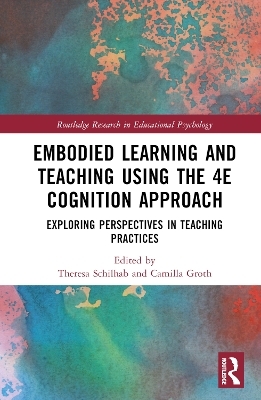
Embodied Learning and Teaching Using the 4E Cognition Approach
Routledge (Verlag)
978-1-032-37731-5 (ISBN)
This book operationalises the new field—EmLearning—that integrates embodiment and grounded cognition perspectives with education using the 4E approach as a guiding principle, which suggests that cognition is embodied, embedded, enacted, or extended.
Chapters highlight empirical data, providing readers with research-based insight into the theoretical foundations of embodied cognition in learning, illustrated by practical examples. Ultimately, the volume contributes a radical understanding of embodied cognition, demonstrating the importance of the field to the educational system more broadly and suggesting a fundamental change to the way learning, education, and curriculum design are viewed and considered. Based on contemporary scientific findings, the book addresses the educational area with a focus on opening the embodied approach to a wider audience that will circulate the new knowledge and support their educational practices.
Written with the purpose of contributing to a broad spectrum of academic educational fields, this book will be of use to postgraduates, researchers, and academics in the fields of higher education, educational psychology, teacher education, and teaching methodology and practice. Teachers and school politicians should also benefit from this volume more broadly.
The Open Access version of this book, available at www.taylorfrancis.com, has been made available under a Creative Commons Attribution-Non Commercial-No Derivatives (CC-BY-NC-ND) 4.0 license.
Theresa Schilhab is Associate Professor in Educational Neuroscience and Evolutionary Epistemology and leads Science Didactics and Nature Views, Danish School of Education, Aarhus University, Denmark. Camilla Groth is Associate Professor in Arts, Design, and Crafts and leads the Embodied Making and Learning Research group (EMAL), University of South-Eastern Norway.
Part 1: Introduction
Chapter 1 - Introduction to the anthology
Part 2: Language as lived experience
Chapter 2 - Languages are grounded in the body
Chapter 3 - Exploring reading aloud events through embodied learning: Impacts on early literacy
Chapter 4 - Inclusive language teaching
Part 3: Reading and writing in school
Chapter 5 - Substrates, displays, technologies and texts: Embodied, experiential reading
Chapter 6 - Embodied learning with and through different writing methods
Chapter 7 – Long-form silent reading in the contemporary classroom from an embodied learning perspective: “School is probably the worst place to read”
Chapter 8 – Education in the cognitivist and embodied paradigms. Why won’t my students read?
Part 4: Aesthetic learning
Chapter 9 - Thinking through hands in education
Chapter 10 – Why whole-body drawing still matters in our digital age
Chapter 11 - Apprenticeship as a model for teaching and learning in formal education
Part 5: Technology, nature-connectedness, and science learning
Chapter 12 - Conceptualising technology-enhanced embodied pedagogy
Chapter 13 – Smart technology in nature-based learning—embodied and situated processes
Chapter 14 - How nature-like artworks induce perceptual processes benefitting education in general and science education in particular
Part 6: Music and physical education
Chapter 15 - Embodied music learning
Chapter 16 - Teaching and learning in physical education teacher education
Chapter 17 – Embodied learning in interaction: The case of aikido
Part 7: Conclusions
Chapter 18 – Conclusions
| Erscheinungsdatum | 01.06.2024 |
|---|---|
| Reihe/Serie | Routledge Research in Educational Psychology |
| Zusatzinfo | 7 Line drawings, black and white; 17 Halftones, black and white; 24 Illustrations, black and white |
| Verlagsort | London |
| Sprache | englisch |
| Maße | 156 x 234 mm |
| Gewicht | 560 g |
| Themenwelt | Geisteswissenschaften ► Psychologie ► Allgemeine Psychologie |
| Geisteswissenschaften ► Psychologie ► Pädagogische Psychologie | |
| Geisteswissenschaften ► Psychologie ► Verhaltenstherapie | |
| Geisteswissenschaften ► Sprach- / Literaturwissenschaft ► Anglistik / Amerikanistik | |
| Geisteswissenschaften ► Sprach- / Literaturwissenschaft ► Literaturwissenschaft | |
| Sozialwissenschaften ► Pädagogik | |
| ISBN-10 | 1-032-37731-3 / 1032377313 |
| ISBN-13 | 978-1-032-37731-5 / 9781032377315 |
| Zustand | Neuware |
| Informationen gemäß Produktsicherheitsverordnung (GPSR) | |
| Haben Sie eine Frage zum Produkt? |
aus dem Bereich


